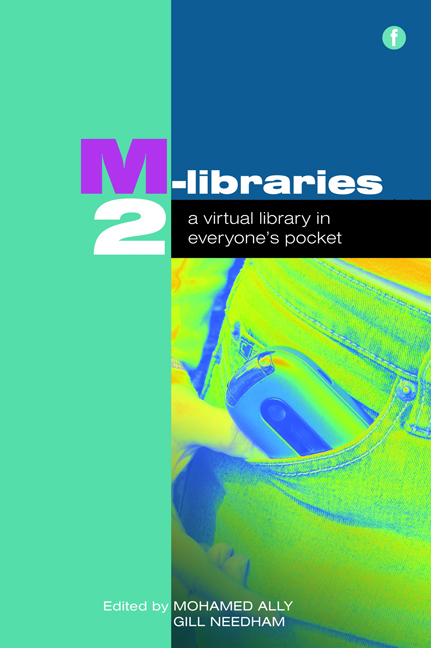Book contents
- Frontmatter
- Contents
- Acknowledgements
- Contributors
- Foreword
- Introduction
- PART 1 M-LIBRARIES: DEVELOPMENTS AROUND THE WORLD
- PART 2 TECHNOLOGY IN M-LIBRARIES
- PART 3 APPLICATION OF M-LIBRARIES
- 12 Mobile access for workplace and language training
- 13 Service models for information therapy services delivered to mobiles
- 14 Health literacy and healthy action in the connected age
- 15 ‘Ask us upstairs’: bringing roaming reference to the Paley stacks
- 16 The role of an agent supplying content on mobile devices
- 17 Portable science: podcasting as an outreach tool for a large academic science and engineering library
- PART 4 M-LIBRARIES AND LEARNING
- PART 5 BUILDING THE EVIDENCE BASE FOR M-LIBRARIES
- Conclusion
- Index
12 - Mobile access for workplace and language training
from PART 3 - APPLICATION OF M-LIBRARIES
Published online by Cambridge University Press: 08 June 2018
- Frontmatter
- Contents
- Acknowledgements
- Contributors
- Foreword
- Introduction
- PART 1 M-LIBRARIES: DEVELOPMENTS AROUND THE WORLD
- PART 2 TECHNOLOGY IN M-LIBRARIES
- PART 3 APPLICATION OF M-LIBRARIES
- 12 Mobile access for workplace and language training
- 13 Service models for information therapy services delivered to mobiles
- 14 Health literacy and healthy action in the connected age
- 15 ‘Ask us upstairs’: bringing roaming reference to the Paley stacks
- 16 The role of an agent supplying content on mobile devices
- 17 Portable science: podcasting as an outreach tool for a large academic science and engineering library
- PART 4 M-LIBRARIES AND LEARNING
- PART 5 BUILDING THE EVIDENCE BASE FOR M-LIBRARIES
- Conclusion
- Index
Summary
Introduction
The ‘Workplace English’ site was created for English language learners to study grammar and vocabulary that can be used every day at work. Vocabulary and workplace-specific situations are used to teach useful, everyday English. The site was designed to be accessed by mobile devices, allowing learners to choose their own classroom and their own study schedule, e.g. on the bus or in their lunch break at work. The site created in this project can be duplicated for other library applications that will allow learners to access information and course materials at any time and from anywhere. The information and course materials are stored in the library repository.
Athabasca University (AU) created the Mobile ESL (English as a second language) site in 2007 (www.eslau.ca). It was pilot tested with several ESL groups, with successful results. The students found the site to be useful, but wanted more listening practice, and situations that they could watch and use as models for functioning in an Englishspeaking world. Students also asked to see vocabulary that they might face in workplace situations. This resulted in the creation of the Athabasca University Workplace English site, www.wpeau.ca (see Figure 12.1).
The course content consists of over 80 lessons and related exercises teaching the basics of the English language, ranging from the difference between ‘is’ and ‘are’ to verb tenses, countable nouns and other aspects of basic grammar. These digital lessons have been adapted into reusable multimedia learning objects which are accessible to anyone on the internet either as stand-alone lessons, as groups of lessons in units or as full course modules. The content materials are in digitized form, with interactive elements added to enhance flow and motivation. Specifically, the content has been rendered interactive using a variety of multiple-choice, short-answer, jumbled-sentence, matching/ ordering or filling-in-the-gap exercises on the world wide web and it has been specifically formatted for output using small mobile devices.
Explanation of content
Before creating some of the content for this site AU spoke with ESL students living and working in Northern Alberta. They asked to see content that reflected their life situations more clearly and to learn vocabulary they were hearing everyday in the workplace. Specialized vocabulary from eight different career fields was added to typical grammar lessons.
- Type
- Chapter
- Information
- M-Libraries 2A virtual library in everyone's pocket, pp. 117 - 124Publisher: FacetPrint publication year: 2010
- 2
- Cited by



